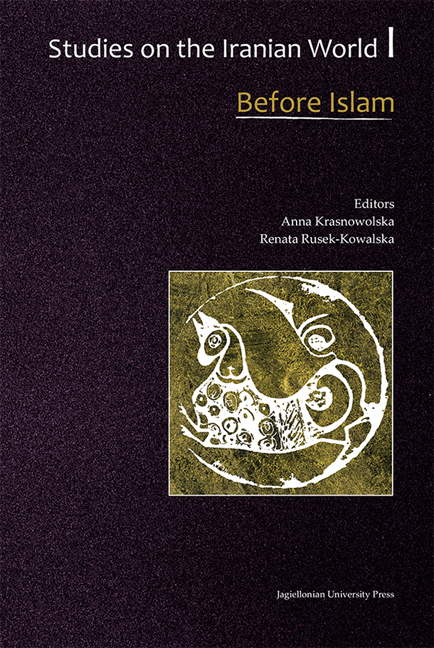Book contents
- Frontmatter
- Contents
- Foreword
- Linguistics
- The Old Persian Genitive. A Study of a Syncretic Case
- Nominal Compound Strategies in Middle Iranian Languages
- Alan Place-names in Western Europe
- Work in Progress: The Catalogue of the Buddhist Sogdian Fragments of the Berlin Turfan Collection
- Preliminary Remarks on Middle Persian ‹nc› in the Pahlavi Documents
- Literature
- Religion
- History
- Archaeology
Preliminary Remarks on Middle Persian ‹nc› in the Pahlavi Documents
from Linguistics
Published online by Cambridge University Press: 12 January 2018
- Frontmatter
- Contents
- Foreword
- Linguistics
- The Old Persian Genitive. A Study of a Syncretic Case
- Nominal Compound Strategies in Middle Iranian Languages
- Alan Place-names in Western Europe
- Work in Progress: The Catalogue of the Buddhist Sogdian Fragments of the Berlin Turfan Collection
- Preliminary Remarks on Middle Persian ‹nc› in the Pahlavi Documents
- Literature
- Religion
- History
- Archaeology
Summary
SUMMARY
In the Pahlavi documents we find a sequence of characters that are commonly transliterated as ‹nc›, representing Middle Persian namāz ‘reverence.’ The vocalisation as namāz, a word most commonly found in the greeting formulae of letters, is not disputed. The question is rather whether these characters stand for a phonetic, albeit abbreviated, spelling of namāz or whether they constitute an abbreviation that developed out of the heterogram ‹‘SGDH›.
In light of recent developments in the field and the rather sizeable evidence, I will revisit the arguments brought forward thus far and propose a new interpretation.
Middle Persian (MP) namāz ‹‘SGDH, nm'c› ‘reverence, prostration, prayer’ is well attested in Zoroastrian Middle Persian (ZMP), Manichaean MP (MMP) as well as Pahlavi documents (PD). Since Hansen (1938: 25), a sequence of characters in the PDs have commonly been transliterated as ‹nc›, representing namāz. The vocalisation of ‹nc› is not disputed and its syntax in the context of the greeting formulae has been discussed by Weber in a number of publications. The questions at hand are whether these characters stand for a phonetic or heterographic spelling and whether they represent an abbreviation. In the following, I would like to offer a short overview of namāz in ZMP, before turning my attention to its spelling in the PDs.
Although not noted by MacKenzie (1990) in his dictionary, namāz can be compounded with the verb kardan ‘to do, make, act, perform’ and its derived forms to convey a meaning semantically closer to ‘to worship.’ In such cases it is semantically closer to NP namāz xwāndan:
MX 53 (1) pursīd dānāg ō mēnōy ī xrad (2) kū namāz ud stāyišn ī yazadān čiyōnkunišn … (5) ud hamgōnag padīrag māh ud ātaxš ī wahrām ayāb ātaxš ī ādarōgbāmdād ud nēm-rōz ud ēbārag namāz ud stāyišn kardan. (1) Dānāg asked MX: (2) How is the reverence and praise of the deities to be performed? … (5) And likewise, they are to be revered and praised in the morning, noon and evening, facing the moon and a wahrām fire or ādarōg fire.
Similarly, in Gizistag Abāliš
harw kas bāmdād ka az wistarag abar āxēzed dast nē šōyed namāz (ī) yazad (ud)stāyišn ī yazadān nē kunēd …
- Type
- Chapter
- Information
- Studies on the Iranian World: Before IslamMedieval and Modern, pp. 67 - 74Publisher: Jagiellonian University PressPrint publication year: 2015



